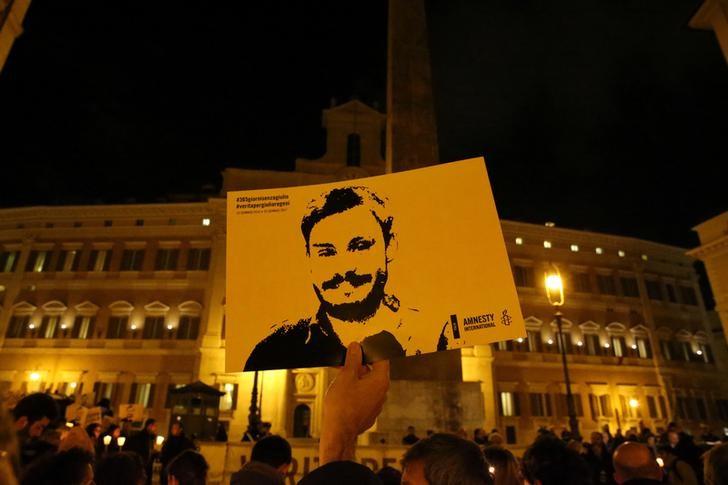
ROME (Reuters) – Italian prosecutors asked a judge on Thursday to have four senior members of Egypt’s security services sent for trial over their suspected role in the disappearance and murder of student Giulio Regeni in Cairo in 2016.
Regeni, a postgraduate student at Britain’s Cambridge University, disappeared in the Egyptian capital in January 2016. His body was found almost a week later and a post mortem examination showed he had been tortured before his death.
Italian and Egyptian prosecutors investigated the case together, but the two sides later fell out and came to very different conclusions.
The Rome prosecutors have accused four officials of the “aggravated kidnapping” of Regeni and in addition say one of them, Major Magdi Sharif, from General Intelligence, should be charged with “conspiracy to commit aggravated murder”.
Egyptian police and officials have denied any involvement in Regeni’s killing. Egyptian prosecutors said last year they “did not support” the Italian findings and asked for the accusations against the four to be removed from case documents.
Italian judicial sources say their Egyptian counterparts have not supplied the addresses of the four suspects and none of them are expected to attend any eventual trial. A source said Italy had not issued international arrest warrants for them.
A judge suspended Thursday’s preliminary hearing in the case until May 25 as one of the court-appointed defense lawyers had contracted the coronavirus and could not attend. A full trial is unlikely to start before the summer recess.
TORTURE
Regeni had been in Cairo to research Egypt’s independent unions for his doctoral thesis. Associates say he was also interested in the long-standing domination of Egypt’s economy by the state and military. Both subjects are sensitive in Egypt.
Prosecutors say they have evidence showing that Sharif got informants to follow Regeni and eventually had him arrested. The charge sheet says Sharif, and other, unidentified Egyptian officials, then tortured the Italian over several days, causing him “acute physical suffering”.
Giving details from the autopsy, prosecutors say Regeni’s teeth were broken, while he also suffered multiple fractures to his shoulders, wrist, hands and feet. He was eventually killed by a blow to the neck.
Egyptian officials could not be reached for comment on the prosecutors’ charge sheet.
Prosecutors say they have been approached by new witnesses in recent weeks. Two reported seeing Regeni while he was being questioned, while a third had knowledge of contacts between a union chief and the security forces that related to the student.
Regeni’s death soured relations between Italy and Egypt and Rome initially withdrew its ambassador from Cairo in protest. It subsequently restored its top envoy and there has been no let-up in trade relations.
Days after prosecutors called for the trial of the four Egyptians, Italy handed over the first of two frigates to the Egyptian navy in a deal worth up to 1.2 billion euros ($1.45 billion). ($1 = 0.8270 euros)
Additional reporting by Domenico Lusi; Editing by Gareth Jones
IMAGE: A man holds a placard during a vigil to commemorate Giulio Regeni, who was found murdered in Cairo a year ago, in downtown Rome, Italy January 25, 2017. REUTERS/Alessandro Bianchi




